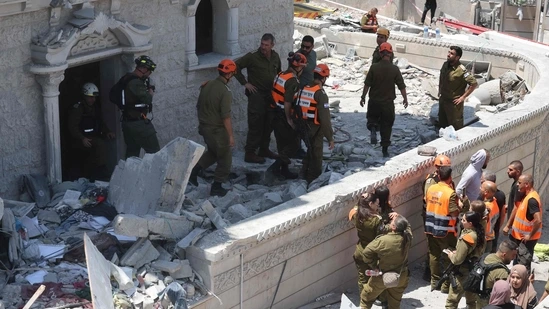In a significant escalation of Middle East tensions, Iran and Israel have engaged in direct military confrontation, triggering global concern over regional stability and the potential for a wider conflict. This marked one of the most serious clashes between the two rival nations in recent history, with both sides exchanging drone and missile attacks.
Background: Years of Tension
Iran and Israel have long been geopolitical enemies. While Iran supports militant groups like Hezbollah and Hamas, which oppose Israel, the Israeli government has conducted numerous covert and overt strikes against Iranian military installations in Syria and other parts of the region.
Recent months saw a sharp rise in hostility. Following increased Israeli military operations in Syria and an alleged Israeli strike on an Iranian consulate building in Damascus, tensions boiled over.
The Attack: What Happened?
In a bold and unprecedented move, Iran launched a large-scale aerial attack on Israel, involving over 300 drones and missiles. According to official sources:
- Most of the projectiles were intercepted by Israel’s advanced Iron Dome and David’s Sling defense systems, with assistance from allies including the U.S., U.K., France, and Jordan.
- Despite the massive barrage, damage on Israeli soil was minimal, though a few strikes hit infrastructure in the Negev Desert.
- One young girl was critically injured due to falling shrapnel.
Israel responded swiftly. Within hours, the Israeli Air Force carried out retaliatory strikes inside Iran, reportedly targeting air defense systems and military bases in Isfahan, a city close to Iranian nuclear facilities. However, both Iran and Israel downplayed the extent of damage caused.
Key Targets & Damage:
- Iran’s drone and missile bases were primary Israeli targets.
- Israeli intelligence claims to have successfully disrupted Iranian radar and missile-launching capabilities.
- Iran said it “thwarted” the Israeli retaliation and warned of further consequences if provoked again.
Global Reactions
World leaders immediately called for restraint:
- U.S. President Joe Biden affirmed support for Israel’s defense but urged against full-scale war.
- United Nations called for both parties to return to diplomatic engagement to prevent escalation.
- Arab nations, while critical of Israel’s previous actions, have expressed deep concern about Iran’s bold offensive and fear regional destabilization.
Are We Headed for a Larger War?
The world watches anxiously as two of the region’s most powerful military forces test each other’s limits. While both nations claim they do not seek full-scale war, the risk of miscalculation or accidental escalation remains dangerously high.
This direct exchange marks a historic shift in the Iran-Israel standoff. Previously limited to proxy wars and covert strikes, the current attacks reveal a new phase—open confrontation.
Conclusion
The Iran-Israel conflict has reached a critical turning point. While both countries have shown military capability and strategic calculation, the coming days will reveal whether diplomacy can pull them back from the brink—or if the region is heading toward a broader, more devastating conflict.
Follow this blog for real-time updates, expert analysis, and in-depth reporting on Middle East geopolitics.

